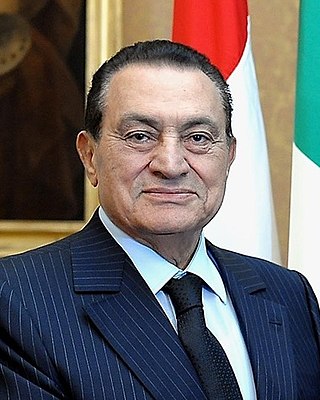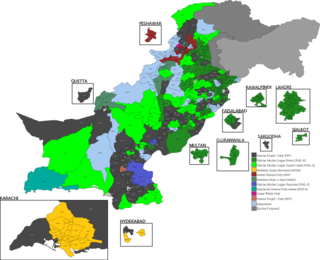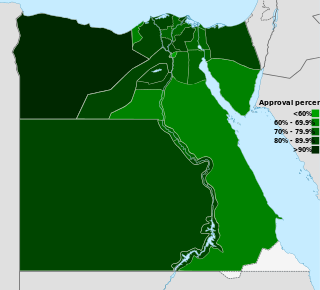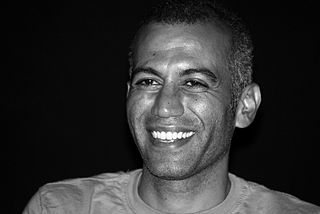 |
|---|
Contents |
| Constitution (history) |
| Political parties (former) |
 |
|---|
Contents |
| Constitution (history) |
| Political parties (former) |
In the 2005 Egypt legislative elections, there was a significant presence of members of the (formally banned) Muslim Brotherhood. While running as independents in the elections, members of the Brotherhood increased presence in parliament from to 88 of 454 seats, though this did not alter the dominant status of the National Democratic Party (NDP). The Egyptian government was criticized by judges in failing to dissuade intimidation of voters; as such, judges would not certify election results.
The government postponed the 2006 municipal elections until 2008 and began taking severe measures against the Muslim Brotherhood. Next, the 2007 constitutional amendments banned political parties based on "any religious frame of reference," to short-circuit attempts by the Brothers to form a political party. [1] In 2008, municipal elections that the Muslim Brothers tried to contest were summarily fixed, sealed and delivered to the NDP, without a single seat allowed the Brothers out of 52,000. [1] Thus, in 2008 in the postponed election, the Brotherhood was prevented from obtaining significant wins in the election, and moreover, many senior members of the group were sentenced to long-term prison convictions. [2] Repression of the Muslim Brothers is standard, but the regime is now also keen to ruin the Brothers’ reputation for competence and clean hands. To tarnish the Brothers in the popular imagination, state television used the peak viewing season of Ramadan to air a slickly produced mini-series about the Brothers in their founding years. Appearing before the prosecution, one of the accused Brothers told the press, "It's all very obvious. There's no case here. The NDP wants to ruin our reputation. But the people and our constituents know us very well." [1]
Prior to the elections, Human Rights Watch alleged mass round-ups of 800 opposition Muslim Brotherhood candidates and would-be electoral candidates. [3] HRW also cited the delaying of a military court announcement for 40 Muslim Brotherhood leaders accused of belonging to an illegal organization until April 15, a week after the elections. [3] A general strike was called for 6 April to protest low wages and rising food costs, with the Muslim Brotherhood giving support to the strike. [4]
On 7 April, the day before the election, the Muslim Brotherhood announced it would boycott the election, after being allowed to compete for 20 seats amongst the 52,000 total seat available nationally. [5] The ruling National Democratic Party, led by President Hosni Mubarak was unopposed for election in 70% of the seats. [6] The Muslim Brotherhood and other independents subsequently "lost" all 52,000 seats to the NDP. [7]

The Society of the Muslim Brothers, better known as the Muslim Brotherhood, is a transnational Sunni Islamist organization founded in Egypt by Islamic scholar and schoolteacher Hassan al-Banna in 1928. Al-Banna's teachings spread far beyond Egypt, influencing today various Islamist movements from charitable organizations to political parties.

Elections in Egypt are held for the president and a bicameral legislature. The president of Egypt is elected for a six-year term by popular vote after draft amendments to the 2013 constitution altered the presidential term limits from the original four years to six years.

The National Democratic Party, often referred to in Egypt as simply the National Party, was the ruling political party in Egypt from 1978 to 2011. It was founded by President Anwar Sadat in 1978. The NDP wielded uncontested power in state politics, usually considered a de facto single party, with authoritarian characteristics, inside an officially multi-party system, from its creation until the resignation of Sadat's successor Hosni Mubarak in response to the Egyptian Revolution of 2011.

Kefaya is the unofficial moniker of the Egyptian Movement for Change, a grassroots coalition which prior to the 2011 revolution drew its support from across Egypt's political spectrum. It was a platform for protest against Hosni Mubarak's presidency and the possibility he might seek to transfer power directly to his son Gamal; political corruption and stagnation; "the blurring of the lines between power and wealth; and the regime's cruelty, coercion and disregard for human rights."

Presidential elections were held in Egypt on September 7, 2005, the first to feature more than one candidate. Incumbent president Hosni Mubarak was re-elected for a fifth consecutive six-year term in office, with official results showing he won 88.6% of the vote. Mubarak's main opponent, Ayman Nour, of the El-Ghad Party, is estimated to have received 7.3% of the vote and Numan Gumaa received 2.8%, however, Nour claimed that prior polling results showed over 30%. Criticism of the election process has centred on the process of selecting the eligible candidates, and on alleged election-law violations during voting. Mubarak was sworn in for his new term on September 27.
The Muslim Brotherhood is an Islamic organization that was founded in Ismailia, Egypt by Hassan al-Banna in March 1928 as an Islamist religious, political, and social movement. The group spread to other Muslim countries but has its largest, or one of its largest, organizations in Egypt, where for many years it has been the largest, best-organized, and most disciplined political opposition force, despite a succession of government crackdowns in 1948, 1954, 1965 after plots, or alleged plots, of assassination and overthrow were uncovered. Following the 2011 Revolution the group was legalized, and in April 2011 it launched a civic political party called the Freedom and Justice Party (Egypt) to contest elections, including the 2012 presidential election when its candidate Mohamed Morsi became Egypt's first democratically elected president. One year later, however, following massive demonstrations, Morsi was overthrown by the military and arrested. As of 2014, the organization has been declared a terrorist group by Russia, Egypt, UAE, Saudi Arabia and is once again suffering a severe crackdown.

General elections were held in Pakistan on 18 February 2008 to elect members of the 13th National Assembly and the four Provincial Assemblies.

Elections for the Shura Council were held in Egypt on 11 and 18 June 2007. From a total of 264 seats in the Shura Council, the upper house of the Egyptian parliament, 88 are for election every three years.

Parliamentary elections were held in Egypt in 2010. The first stage was held on 28 November 2010 and the second round was held on 5 December 2010.
Parliamentary elections were held in Egypt in three stages between 18 October and 8 November 2000. The result was a victory for the ruling National Democratic Party (NDP), which won 353 of the 454 seats, with 35 of the 72 independents elected joining the NDP after the elections. The banned Muslim Brotherhood came in a distant second, with 17 of its candidates elected running as independents. The remaining opposition parties won 16 seats.

In Egypt, the Muslim Brotherhood is a Sunni Islamist religious, political, and social movement, with adherents estimated to number between 2 and 2.5 million. Founded by Hassan al-Banna in 1928, the group spread to other Muslim countries but has its largest organization in Egypt, despite government crackdowns in 1948, 1954, 1965 and 2013, after plots, or alleged plots, of assassination and overthrow were uncovered.

Parliamentary elections were held in Egypt from 28 November 2011 to 11 January 2012, following the revolution that ousted President Hosni Mubarak, after which the Supreme Council of the Armed Forces (SCAF) dissolved Parliament. However the dissolution was ruled unconstitutional and Parliament was reinstated. Originally, the elections had been scheduled to be held in September 2011, but were postponed amid concerns that established parties would gain undue advantage.

A constitutional referendum was held in Egypt on 19 March 2011, following the 2011 Egyptian revolution. More than 14 million (77%) were in favour, while around 4 million (23%) opposed the changes; 41% of 45 million eligible voters turned out to vote.

The Egyptian Crisis was a period that started with the Egyptian revolution of 2011 and ended with the installation of a counterrevolutionary regime under the presidency of Abdel Fattah el-Sisi in 2014. It was a tumultuous three years of political and social unrest, characterized by mass protests, a series of popular elections, deadly clashes, and military reinforcement. The events have had a lasting effect on the country's current course, its political system and its society.

Hossam el-Hamalawy is an Egyptian journalist, blogger, photographer and socialist activist. He is a member of the Revolutionary Socialists and the Center for Socialist Studies.

General elections were held in Bangladesh on 5 January 2014, in accordance with the constitutional requirement that elections must take place within the 90-day period before the expiration of the term of the Jatiya Sangshad on 24 January 2014.

The Egyptian Constituent Assembly of 2012 (CA) is the committee for the creation of a new Constitution of Egypt. The Muslim Brotherhood had announced that the Constituent Assembly would vote on the constitution on 29 November 2012. The Constituent Assembly will be able to avoid its possible dissolution by voting on the constitution earlier than the release of a ruling by the Supreme Constitutional Court on the assembly's legitimacy; the ruling was expected to occur on 2 December 2012. The court has postponed the verdict in response to protests. The Constituent Assembly approved the constitution on 29 November 2012; more than 16 hours were spent voting on its articles.

A constitutional referendum was held in Egypt in two rounds on 15 and 22 December 2012. Egyptians living abroad were scheduled to vote between 8 and 11 December. Voting for expatriates had been delayed until 12 December 2012 and was extended until 17 December 2012. Voters were asked whether they approve of the draft constitution that was approved by the Constituent Assembly on 30 November 2012.

The Freedom and Justice Party is an Egyptian Islamist political party. The ex-president of the party, Mohamed Morsi, won the 2012 presidential election, and in the 2011 parliamentary election it won more seats than any other party. It is nominally independent, but has strong links to the Muslim Brotherhood of Egypt, the largest political group in Egypt. The party was banned and dissolved in 2014; however, it continues to function underground.

Public discussion about holding new Egyptian municipal elections has occurred fitfully since provisions for reorganized local councils were established by the 2014 Constitution.